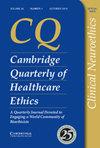"临终厌食症"、拒绝治疗和决策能力。
IF 2.3
4区 医学
Q3 HEALTH CARE SCIENCES & SERVICES
引用次数: 0
摘要
厌食症患者在拒绝治疗可能导致致命后果的情况下是否应该拒绝治疗,这是一个令人困扰的话题。最近有人提出了一个新的 "临终厌食症 "类别,它提出了在什么情况下可以采取姑息治疗甚至医生协助自杀的标准。作者认为,这一诊断建议将厌食症与躯体疾病相类比,并强调饥饿的影响,从而对疾病的发展轨迹产生了错误的确定感。此外,这一概念与符合临终厌食症诊断标准的个体具有决策能力的说法相冲突。因此应予以摒弃。本文章由计算机程序翻译,如有差异,请以英文原文为准。
"Terminal Anorexia", Treatment Refusal and Decision-Making Capacity.
Whether anorexic patients should be able to refuse treatment when this refusal potentially has a fatal outcome is a vexed topic. A recent proposal for a new category of "terminal anorexia" suggests criteria when a move to palliative care or even physician-assisted suicide might be justified. The author argues that this proposed diagnosis presents a false sense of certainty of the illness trajectory by conceptualizing anorexia in analogy with physical disorders and stressing the effects of starvation. Furthermore, this conceptualization is in conflict with the claim that individuals who meet the diagnostic criteria for terminal anorexia have decision-making capacity. It should therefore be rejected.
求助全文
通过发布文献求助,成功后即可免费获取论文全文。
去求助
来源期刊
CiteScore
2.90
自引率
11.10%
发文量
127
审稿时长
>12 weeks
期刊介绍:
The Cambridge Quarterly of Healthcare Ethics is designed to address the challenges of biology, medicine and healthcare and to meet the needs of professionals serving on healthcare ethics committees in hospitals, nursing homes, hospices and rehabilitation centres. The aim of the journal is to serve as the international forum for the wide range of serious and urgent issues faced by members of healthcare ethics committees, physicians, nurses, social workers, clergy, lawyers and community representatives.

 求助内容:
求助内容: 应助结果提醒方式:
应助结果提醒方式:


